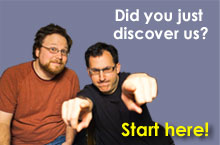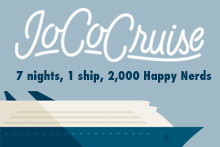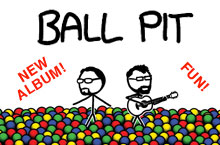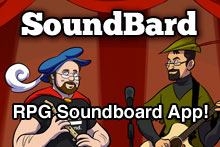We regularly get asked different variations on the “how can I do [creative job here] professionally?” question.
One of the better versions of The Question came to us a while back from Peter Chiykowski (a multi-talented fellow who contributed a choice bit of art that ended up as the thumbnail image for our “Westerosi Pie” video), who phrased it thusly:
“…could [you] share any advice you wished you’d been given way back when you made the leap to being full-time musicians and comedians.”
…which seemed like a good framework for unloading our accumulated wisdom for people seeking to do just about anything as an independent creative-type person.
Do The Thing
Don’t wait, do it now. And no, that doesn’t mean you have to or should quit your “regular” job. Want to be a writer? Get to writing. Musician? Make music. Don’t have time? Find it. And if you can’t find it, maybe what you want isn’t so much to be an independent creative whatever, but to not have to work for someone else (or have a job at all). In which case we can nae help ye.
But if there’s something that in your heart of hearts you know would THRILL YOU FOR THE REST OF YOUR LIFE if you could do it as your main means of income, you can find the time. Maybe it’s in the morning before work, or when you get home. Got an afternoon or day off? Well there you go.
Worried because no one cares? That’s the greatest: you’re free to try things without outside expectations! Make mistakes and learn from them. Build on what works. Back-burner or forget what doesn’t. Look for people, audiences, and communities that want to see/hear/touch/taste/whatever what you got. Listen to their reactions and feedback, even if it’s not necessarily what you want to hear (but ignore the true Haters.)
If and when you see enough positive indicators, that’s when you mash down on the gas pedal. For us, our old band Da Vinci’s Notebook was booking enough gigs that we were essentially working two full-time jobs. So we were more or less forced to decide.
But it doesn’t have to be that obvious. Maybe your writing is getting picked up by more and more prestigious outlets. Or you’ve started a Patreon or Kickstarter for your art or videos and it’s raking it in. Perhaps people have started hucking money at you when you walk down the street. The key thing is that when strangers are interested in what you’re doing, and they’re willing to pay you to do it, it’s a good sign you’re on the right track. It doesn’t mean you’ll make the big time, or even make a living over the long haul. But you at least have something.
If and when you are successful, Do The Thing never stops applying. If you’re super excited about a new idea, jump into it. Of course if you have lots of those ideas, you’ll have to prioritize them, as time is a limited resource. Which means you’ll need to listen to and hone your instincts to determine which ideas and opportunities will be the most likely to succeed and/or most fulfilling. Ultimately it’s those instincts that will determine your path.
Recognize and adapt to your opportunities (a.k.a. luck is manufactured)
It’s great to have ideas about specific projects, vibes, or spheres you want to pursue, but it could turn out that the world doesn’t want that from you. If so, don’t despair: there could be plenty of things that will work for you that you might never have considered before. Keep an open mind.
And the people with the most longevity are often those who constantly grow and/or reinvent themselves, in great part by recognizing and being open to trying things that might be stretches. Be interesting and stay interesting.
Just as important: if you continue to develop and diversify your skill sets and audiences, being an independent creator can become as secure as any other career. Possibly more, given the way things have been trending.
Don’t be afraid to give up the good to go for the great
That’s John D. Rockefeller’s string of words, and it’s corollary to the observations about opportunities. It can be easy to just run with an opportunity that’s convenient / safe / pays well / is just merely good, but doesn’t bring you great joy, or might inhibit you from doing something truly great.
So in addition to taking chances and stretching your skills, avoid over-committing to projects you’re not crazy about. Because if your days become a slog, what was the point of quitting your job in the first place?
That said, working for yourself and/or having greater schedule flexibility are other good reasons people strike out on their own. If that’s you, and you’ve found one of these Good Opportunities, congrats: success condition met!
Honor your commitments
Of course this a good thing to do no matter what. But in entertainment, it’s hyper-important, because professional creative circles are often tight-knit. And it applies to everything: anyone who books, publishes, or commissions you; your fans and backers; those you might employ or hire on contract; etc.
That said, if things go well, there will be times when an AMAZING OPPORTUNITY will come along, but you’ve already committed to something else. Don’t Panic. Usually people in entertainment will understand your situation, because they’ve been there, too. So if and when they release you from the obligation, find a way to make good.
For example, maybe you agreed to go to TinyCon as their Guest of Honor, but That Popular Cartoon You Love contacts you to work on their Season 5, they need you on the same weekend, and the dates aren’t flexible. Only a horrible monster would want to keep you from that opportunity, and there are few horrible monsters in the nicer corners of entertainment. So they let you off the hook, and you send along some special signed art to auction for charity, and help them find a suitable replacement guest. Ta-da! You’ve just earned yourself nearly as much goodwill as you would have if you’d been able to do the gig (perhaps more—you could have made an ass of yourself at the gig!)
And goodwill is important…
“Networking” is a compost heap
Bear with us on this one.
It does sometimes happen, but it’s rare for opportunities to just drop into your lap. So it’s important to always be expanding the number of people who are aware of and think favorably of you. And one of the best ways to achieve that is to actually care about what they do, which can’t be faked or forced—most people in entertainment have sensitive radar for detecting when people view them as stepping stones.
For making initial contact with just about anyone, keep it short, respectful, and free of expectations: you can lead a horse to water, but you can’t make it listen to your podcast. Don’t be surprised if you don’t hear back most of the time, or get a form letter, email from an assistant, etc. Active independent creators are often super-busy, and probably get a lot of contact requests similar to yours, and there are only so many hours in the day! It’s okay to follow up, but if you push too hard you risk being seen as Annoying, which is a deep hole to dig out of.
Even if you do make direct contact, don’t be frustrated or discouraged if things don’t happen right away. (They usually don’t.) Every person you encounter who leaves with a favorable impression of you is someone who might be a future collaborator / client / employee / fan / whatever. This includes people you might not currently think of as being in your circle, or even in the same dimension (like people who aren’t in entertainment at all). It also includes fans, some of whom will eventually be in decision-making positions relevant to your interests.
Each of these people you connect with in a positive way goes onto your compost heap (and you onto theirs) which, with time, will yield fertile soil. You can’t predict who it will be or when, but the larger and more active your pile, the more soil it will yield.
Building a community is, in a way, another type of compost heap. Same deal: the more you feed it, the more it will yield.
Here’s a handy Compost Heap Improvement checklist:
- Be nice to everybody, whether you think they can “do anything for you” or not
- Be patient / don’t be annoying
- Be genuine
- When in doubt: talk less, listen more
It’s not foolproof, but following the above checklist will improve your chances of people having a positive impression of you.
Play to your audience(s), but resist the urge to only serve them
Of course it’s good to please your fans and communities, because it can be rewarding both personally and, if things fall right, financially. But hewing too closely to fan expectations can also be a trap, if your heart has moved on. Picasso, Madonna, and Bob Dylan are good examples of successes who pissed off a lot of people by turning away, multiple times, from the things that originally attracted their fans.
There are also plenty of examples of those who made changes that didn’t stick. But again, if you’re staying the course just because it’s the safe path, and it becomes just another job, what’s the point?
That said, it probably doesn’t suck being the Beach Boys. Sure, they’ve been touring with the same songs for fifty years. But they’re songs zillions of people adore, they do it in tricked out buses and planes equipped with hot tubs filled with champagne and lasers and shit, and they stay in hotels made of solid gold. If you find yourself in a similar position, or one close enough to suit you, congrats: success condition met!
Ultimately it’s up to you where you want or need to be on the Creative Satisfaction/Tangible Trappings grid.
You might not succeed or be good at your thing
This one’s not as easy to take in, but it’s important. You can have all the best intentions, you can have everything meticulously mapped out, you can work on your thing diligently and tirelessly. You can “do everything right,” and still fall flat on your face. People may never latch on to your music/art/whatever; they may never fill up audiences at your shows, read your stories, or subscribe to your channel. Your mission may fail.
We’re not saying you should stop trying, or that it’s definitely your fault, or that you have some inherent flaw. There are tons and tons of incredibly talented people who never “made it,” for a host of reasons, or even no good reason at all.
That said, not everyone is good at the things they want to pursue. Every creative endeavor involves honing specialized skills, and some people have more raw material for a given thing than others. We both loved playing baseball when we were kids, but no matter how hard we worked, we came to realize that we didn’t have the talent to “make it to the big leagues” (or, for that matter, out of the rec leagues). So too, many work very hard studying music theory, composition and/or an instrument, but never find the knack for writing catchy melodies. You can know all about story structure, but still not be able to tell a compelling story.
Does this mean you should give up and stop what you’re doing if you’re not instantly great at it? Hell no. But there may come a point when you should be realistic and honest with yourself about whether your abilities can ever rise to meet your ambitions.
Assess your weak spots, dig down deep, and work to improve. And if you’re still not great at the thing, maybe you’ve found an aspect of it you are great at, and that you believe you can enjoy. Maybe you’re not the best guitarist, but it turns out you’re really good at and like tour management, or arranging or directing music. Or you’re not the best cartoonist, but it turns out you’re a great illustrator or teacher. Part of being great at a thing is realizing the thing that you’re great at. (Tautology? Maybe. But true.)
Every pursuit has its rewards, though they may not be the ones you originally sought. Many people go their entire lives without realizing their creative ambitions. Ultimately it’s up to you to decide if and when it’s time to seek different rewards. And the only reward for beating your head against what proves to be a concrete wall is a concussion.
Epilogue
All of this pontification assumes you’re looking not just to make a living with your creative chops, but for it to be an ongoing source of joy that helps bring meaning to your life. We’ve been lucky over the years to have managed that trick, most of the time. Of course there have been plenty of highs and lows along the way.
When we quit our jobs we had no idea if it would work out, or if it did, for how long. But we were young and unburdened enough to be able to try it, and would have regretted it the rest of our lives if we hadn’t. Heck, in Jonathan Coulton’s case, it didn’t work out for him when he went for it after graduating college. But he never stopped Doing The Thing, and nearly a decade later, voila, overnight success.
As we say above, there’s no guarantee that it’ll pan out, even if you do everything “right.” And that’s fine, too. Ultimately you gotta look after yourself and your loved ones, which could mean taking side gigs, day jobs, or even walking away entirely. Everyone has their tolerances for what they need to get by, and to be happy.
LIGHTNING ROUND!
Some of the more practical things we’ve learned, usually the hard way:
- Take care of yourself well when traveling. Plan thoroughly. Keep yourself fed and find the great local food. Get enough sleep.
- Keep a good handle on the business end of things, bookkeeping and scheduling in particular.
- Always read contracts thoroughly.
- ALWAYS READ CONTRACTS THOROUGHLY. And if there’s something in a contract that really bothers you, ask to have it changed. If they won’t change it, and it still bothers you, don’t sign it. If you do, live with the consequences gracefully.
- If and when you can hire people to take non-creative work off your plate (like the items above), DO IT.
- Be wary of people who offer to do things for you for free. Everything has a price. But if you’ve figured out what that non-money price is, and it seems like a good value to you, go for it.
- The four worst words in the English language: “It’ll be great exposure.” Exposure is bullshit. There are absolutely valid reasons to do work below your asking price, or even for free (example: a charity or non-profit whose mission you like, but that doesn’t have much funding). But anyone saying “it’ll be great exposure” usually means “we want work done and we’re not willing [or can’t] pay for it.”
- Don’t undervalue yourself or your work. Ask for more than you think you’ll get (within reason); if you find that you’re starting to actually get that rate, raise your initial asking price.
- Set a ridiculously high price for things you don’t really want to do. (We call this the “Fuck You” Price.) But know that if they accept it (which will happen), you’ll have to do the thing with a smile on your face.
- If someone has promised to pay you, hold them to it.
- One of the highest compliments in music, TV/video, film, and stage work is to be called “a pro.” Here are some of the keys:
- BE ON TIME. This goes triple for studio sessions (TV, film, or audio recording), where time is literally money.
- Always try to make those around you look good.
- On-site anywhere, treat absolutely everyone around you with respect. Co-performers, clients/directors, building maintenance, etc. Everybody. Crew x100. Curtain puller x1,000.
- Get good at learning people’s names (we are notoriously bad at this.)
- In live performance or studio settings, advocate for yourself, but never complain. Yep, there’s a difference. Manage the situation, and you can vent later with trusted friends.
- Accept constructive criticism well, and provide same when appropriate. Know how or learn how to take direction.
- If you mess up during a recorded session of any sort, DO NOT apologize. Get it right the next time. If it’s audio (or video) and the producer (or director) didn’t yell “Cut!”, KEEP GOING until they do.
- Always keep your cool. And keep some extra tucked away, in case you run out.
- It’s tempting to add a lot of dingles and dongles to crowdfunding campaigns. Don’t, unless you have plenty of reliable help (or money) to manage it. They can quickly overwhelm and drag you down. Stay focused on the main thing.
- If and when you find yourself in a position to help others the way you’ve been helped in the past, do it.
We hope some of this is useful to you, or at the very least that your eyes didn’t glaze over after the first four paragraphs.
Good luck!
P&S



